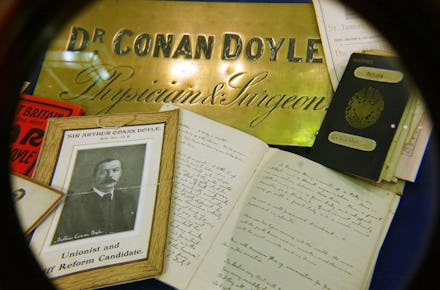Now You Can Read a Long-Lost 'Sherlock Holmes' Story Just Discovered in a Man's Attic

Eighty-five years after Sir Arthur Conan Doyle's death, there are still mysteries to be unraveled regarding his famous most famous creation, detective Sherlock Holmes.
A Scottish man named Walter Elliot recently discovered a long-lost short story involving the detective, called "Sherlock Holmes: Discovering the Border Burgs and by Deduction, the Brig Bazaar," while cleaning out his attic, reports the Guardian.
The 1,300-word story was found in a dusty pamphlet given to Elliot by a friend more than 50 years ago. Elliot, 80, believes that Conan Doyle wrote the piece in a 48-page pamphlet meant to raise money to repair a bridge in the small Scottish town of Selkirk.
The story revolves around a conversation Holmes is having with Dr. John Watson in London. The latter is "having trouble concentrating, leading the great sleuth to deduce that he's excited about an outing to Selkirk to see the bridge," writes the Guardian.
The pamphlet sold for roughly $600 during the bazaar, with proceeds going to maintain the town's iron bridge (still standing, thanks, Sir Arthur!). A schedule in the booklet shows that Conan Doyle was a speaker during the bazaar held to save the bridge. "He really must have thought enough of the town to come down and take part and contribute a story to the book," Elliot told the the Daily Telegraph.
Elliot's discovery is the latest in a string of literary reappearances from famous authors. On Wednesday, an unreleased tale from children's writer Dr. Seuss was announced for a summer debut after his widow found the drawings while cleaning out her house. Earlier this month, To Kill a Mockingbird author Harper Lee made news when her publisher said a second book of hers had been discovered and would be published soon. The lesson here? Clean your house — the publishing industry could really use your help.
The full twisted tale is below:
"We've had enough of old romancists and the men of travel, said the Editor, as he blue-pencilled his copy, and made arrangements for the great Saturday edition of the Bazaar Book. 'We want something up-to-date. Why not have a word from "Sherlock Holmes"?'
Editors have only to speak and it is done, at least, they think so. 'Sherlock Holmes!' As well talk of interviewing the Man in the Moon. But it does not do to tell Editors all that you think. I had no objections whatever, I assured the Editor, to buttonhole 'Sherlock Holmes,' but to do so I should have to go to London.
'London!' scornfully sniffed the Great Man. 'And you profess to be a journalist? Have you never heard of the telegraph, the telephone, or the phonograh? Go to London! And are you not aware that all journalists are supposed to be qualified members of the Institute of Fiction, and to be qualified to make use of the Faculty of Imagination? By the use of the latter men have been interviewed, who were hundreds of miles away; some have been "interviewed" without either knowledge or consent. See that you have a topical article ready for the press for Saturday. Good day'.'
I was dismissed and had to find copy by hook or by crook. Well, the Faculty of Imagination might be worth a trial.
The familiar house in Sloan Street met my bewildered gaze. The door was shut, the blinds drawn. I entered; doors are no barrier to one who uses the Faculty of Imagination. The soft light from an electric bulb flooded the room. 'Sherlock Holmes' sits by the side of the table; Dr Watson is on his feet about to leave for the night. Sherlock Holmes, as has lately been shown by a prominent journal, is a pronounced Free Trader. Dr Watson is a mild Protectionist, who would take his gruelling behind a Martello tower, as Lord Goschen wittily put it, but not 'lying down!' The twain had just finished a stiff argument on Fiscal policy. Holmes loq,-
'And when shall I see you again, Watson? The inquiry into the "Mysteries of the Secret Cabinet" will be continued in Edinburgh on Saturday. Do you mind a run down to Scotland? You would get some capital data which you might turn to good account later.'
I am very sorry,' replied Dr Watson, 'I should have liked to have gone with you, but a prior engagement prevents me. I will, however, have the pleasure of being in kindly Scottish company that day. I, also, am going to Scotland.'
'Ah! Then you are going to the Border country at that time?'
'How do you know that?'
'My dear Watson, it's all a matter of deduction.'"